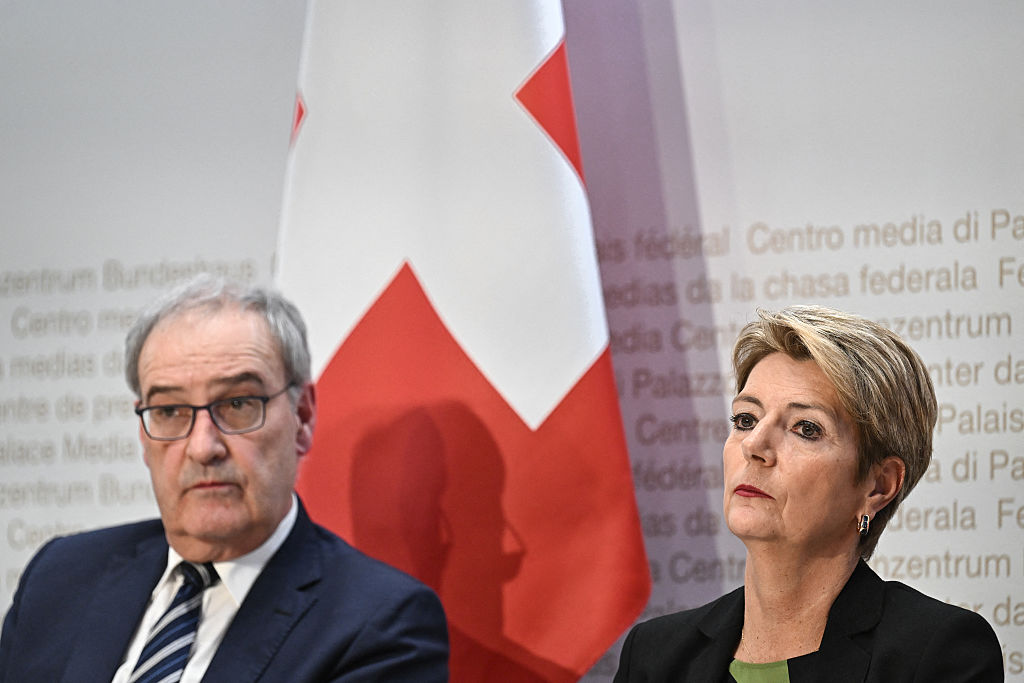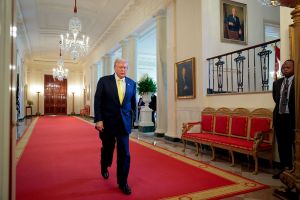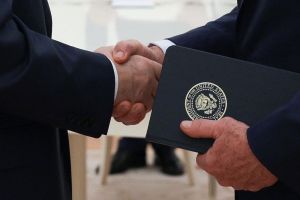The Swiss president and economy minister are rushing to Washington in a last-ditch attempt to reverse Donald Trump’s decision to impose a devastating 39 per cent tariff on Swiss exports. That decision landed in Bern with the force of a punch to the stomach. Officials were blindsided and the stock market and Swiss franc slumped. The tariff, higher than what the EU or UK received, threatens the very foundations of Switzerland’s export-led economy. With just one days before the tariffs come into effect, the mood in Bern is one of quiet panic.
Right up until the announcement Switzerland thought it had done everything right. It sent billions in investment to the US and removed nearly all industrial tariffs on American goods. It signed up early to US-led sanctions against Russia, and in recent years all but dismantled its once-sacrosanct banking secrecy regime at Washington’s request. Switzerland went from being a truly neutral country to towing the line on pretty much everything the US requested. And now none of this deference appears to have counted at all. The Swiss have been hit with one of the harshest tariffs imposed on any US trading partner. In truly humiliating fashion, the new tariffs were announced by Trump on Switzerland’s national day. Now, in a move that smacks of desperation, the Swiss president is making a last-minute, uninvited dash to Washington to plead for mercy. Her mission is so urgent it was launched without a formal White House invitation, in the hope perhaps of securing a face-to-face meeting.
The blow could hardly have landed harder. The US is by far Switzerland’s largest export market. Pharmaceuticals, luxury watches and precision machinery are all heavily reliant on American buyers. Shares in flagship companies like UBS, Richemont and Roche tumbled after the announcement. Analysts immediately downgraded growth forecasts. The Swiss franc fell. What was once a model trade relationship now threatens to upend the country’s economy. Swiss officials had expected perhaps 10 or 15 per cent tariffs, but nothing on this scale.
What makes the blow even harder to swallow is who got off lightly. The EU, of which Switzerland isn’t a member, secured a 15 per cent tariff in its deal with Washington. The UK got a 10 per cent rate. Swiss officials entirely expected to be treated on similar terms, if not better. Switzerland had gone further than most, scrapping all industrial tariffs on US imports and pledging nearly $150 billion in American-bound investment. Instead, it was hit with a 39 per cent levy, one of the highest Trump has imposed on any country. The sense of humiliation is acute. Switzerland believed it was a trusted ally. It’s now wondering if that trust was hopelessly naïve.
The humiliation wasn’t just economic. It was personal. Last Thursday President Karin Keller-Sutter held what officials now describe as a “disastrous” phone call with Trump. For weeks, Swiss negotiators believed they were on track to secure a deal close to the UK’s 10 per cent at most. Instead, Trump made it clear that was off the table. “The woman was nice, but she didn’t want to listen,” he told reporters after the call. He raged about the trade deficit. Reports from Washington suggest that all Trump had focused on was that Switzerland’s deficit was “stealing money” from the US. The next day, when he imposed the 39 per cent tariff, the Swiss press called it Keller-Sutter’s “greatest fiasco”. Blick compared it to the country’s worst military defeat, at the Battle of Marignano in 1515, when Swiss forces were decisively defeated by the French.
A country that once prided itself on independence is learning that deference earns no favors in the age of Trump
At the centre of Trump’s wrath is Switzerland’s vast pharmaceutical sector. Companies like Novartis and Roche dominate Swiss exports to the US. Pharmaceuticals alone account for nearly 50 per cent of Swiss exports. Trump wants the Swiss to cut prices and shift production to America. But the real trigger for the tariffs was the trade imbalance: a $39 billion deficit. Much of that imbalance comes from gold bullion, which merely passes through Switzerland to be refined. More confusing still, both gold and pharmaceuticals are, at least for now, exempt from the new tariffs. Which leaves the Swiss scratching their heads – if the problem isn’t what’s being taxed, what’s Trump punishing them for?
The answer may be that Switzerland was playing by the wrong rulebook. In Bern, officials approached the talks with the US as technocrats, expecting that transparency, fairness, and compliance would be rewarded. They believed in offers that made sense on paper, pledging investment, scrapping tariffs, and upholding the international order. But Trump didn’t focus on that. Perhaps he just wanted spectacle. Perhaps he just wanted to win. “The problem is the Swiss believe we have to make reasonable and honest offers,” one person close to the negotiations told the Financial Times. “We are not good at international power politics”. That misreading of the moment has left Switzerland exposed and scrambling. The goal now appears to be to offer Trump something, anything, that might convince him to reverse course.
Behind closed doors, the Swiss government is hurriedly assembling a package of concessions. Agriculture is said to be on the table, despite fierce opposition from Swiss farmers who have already vowed vehemently to fight any changes. There’s also talk of revisiting the contentious deal for the F-35 fighter jets Switzerland ordered from Lockheed Martin, after Washington requested up to 1.3 billion Swiss francs more than the agreed price. Analysts say opening the contract to further concessions could become part of Bern’s pitch. Officials are also said to be pushing pharma giants to pledge fresh investment in the States, and to lower prices of pharmaceuticals sold there, though the Swiss government has no legal means to compel them. Energy purchases, particularly American LNG, may also be part of the mix. However, Switzerland is a landlocked and nuclear-powered country, and barely uses gas. In short, it seems the Swiss now are preparing to offer a little bit of everything. Whether that’s enough for Trump remains to be seen.
The deeper reckoning is with Switzerland’s foreign policy. In recent years, Switzerland has gradually surrendered its cherished neutrality, not just in rhetoric but in action. It caved on bank secrecy when Washington demanded it. It signed up to US-led sanctions on Russia, aligning itself with Nato positions it once studiously avoided. The once proudly neutral country has become, in effect, a loyal US satellite state, but without the protection or reciprocity the Swiss government thought that status was supposed to guarantee. And now, the Swiss find themselves targeted with the harshest tariffs. It turns out that compliance may not afford privileges. A country that once prided itself on independence is learning that deference earns no favours in the age of Trump. Analysts speculate that Trump’s tariff is less about economics and more about projecting strength against an easy target.
The spectacle of Switzerland grovelling for a better tariff rate, rushing to Washington with watches, LNG pledges and budget sweeteners, is more than a diplomatic embarrassment. It marks the end of an era. A small, rule-abiding country can no longer rely on predictability in global affairs. Switzerland believed that concessions would shield it from geopolitical storms. But it now finds itself alone, humiliated, and economically exposed. Trump’s tariff is a brutal reminder that global trade isn’t governed by fairness, it’s governed by leverage. And in this game, the Swiss have discovered, deference counts for nothing.


























Leave a Reply